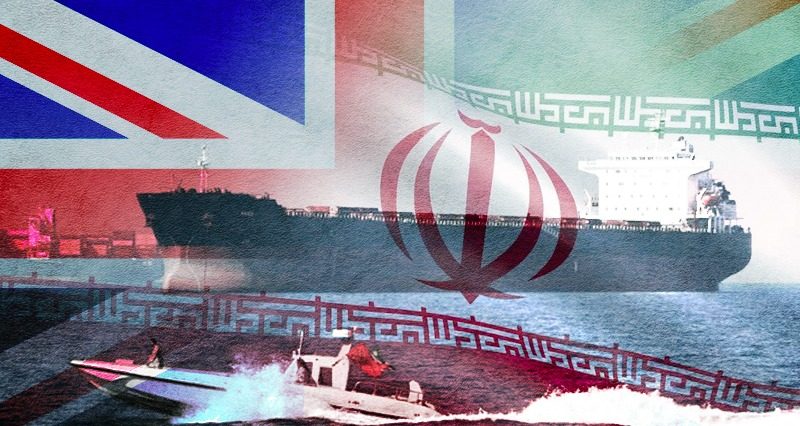WAS IRAN RETALIATING AGAINST THE UK FOR SEIZING ITS TANKER?
Even though Mr. Ali Rabei, the newly appointed speaker of the Iranian Government, and Mr. Mohammad Javad Zarif, the Foreign Minister of the Islamic Republic, officially rejected the claims that Iranian seizure of the British Tanker in the Persian Gulf was a response to the UK’s seizure of a Russian tanker carrying Iranian oil in Gibraltar strait on 4th of July, nearly everyone agrees that if the Iranian oil tanker had not been seized, the British ship would have been released sooner.
WHY THE UK INITIATED THE DEBATE
Since the UK started the conflict over the tankers, the Iranians were explicit that the main purpose of the seizure of the Russian owned supertanker “Grace one”, which was carrying Iranian refined oil, had not been stopping it from reaching Syrian as was announced, but rather served to force Iran to detain a British Ship, thus helping the US drag other countries into its coalition against Iran.
A PROVOCATIVE MOVE!
UK is escalating tensions with Iran for U.S. : Analyst#OilTanker #Iran #Gibraltar #Syria #Sanctions #Grace1 #EU #UnitedStates pic.twitter.com/5XfG93LJqH
— Press TV (@PressTV) 4 июля 2019 г.
The Americans also wanted to stop Iran from circumventing sanctions, and to send the message that they are tracking Iranian ships wherever they go.
They knew that this ship was going to the Mediterranean Sea to distribute Iranian refined oil among smaller ships which would then carry the oil to European countries to sell it directly on the market.
“They wanted to know who was buying Iranian refined oil and, of course, Iran would never willingly yield the names.”
The British and the Americans were also aiming to create chaos to steal attention from the announcement Iran planned to make on July 7th.
The Iranians planned to announce they were suspending some of the commitments they had agreed to in the JCPoA in response to the Americans exit from the deal and European indifference.
Knowing this, the Iranians instead avoided confrontation with the British, preferring to play the game on their own terms.
The Iranians allowed negotiations to take place for about three weeks while issuing threats that their response was incoming. This dramatically raised expenses for the UK’s shipping in the Persian Gulf.
Insurance for British ships intending to travel in the area quickly increased ten-fold.
On the other side, the British failed to get other European countries to support their cause since others were not interested in playing the American’s game.
The British also had to send battleships to the Persian Gulf to protect their trade ships, yet, they knew that it was impossible for a couple of battleships to protect all of the British ships which traverse the Persian Gulf on a daily basis.
It is estimated that about 600 (small to large) British owned ships travel to the Persian Gulf every month, while only a couple of Iranian owned ships travel across the Strait of Gibraltar every month.
They knew that if the Iranians decided to retaliate, it would be very easy for them to seize at least one British ship every day.
The Americans essentially forced the UK into the middle of the conflict, and then refused to defend them.
Iran is neither a member of the EU nor subject to any European oil embargo.
Last I checked, EU was against extraterritoriality.
UK’s unlawful seizure of a tanker with Iranian oil on behalf of #B_Team is piracy, pure and simple.
It sets a dangerous precedent and must end now.
— Javad Zarif (@JZarif) 8 июля 2019 г.
When the Americans found that their plan had not been fulfilled by the UK’s move, they left their ally behind and announced they were not ready to protect British ships.
JEREMY HUNT HAD PROMISED TO SOLVE THE DEBATE BUT THE AMERICANS REFUSED TO ALLOW IT
This lead Mr. Jeremy Hunt, the former foreign minister of UK, to call Mr. Mohammad Javad Zarif and promise to solve the debate within two weeks in a way or another, asking Iran to calm down and wait a couple of days.

But things didn’t go as planned, as the Americans interfered again to ruin the unofficial talks between Iran, the UK and Spain to release the Iranian ship, at which point it was announced that it would be held for another 30 days.
IRAN WAS OBLIGED TO ACT IN RETURN
Keeping the Iranian ship in custody didn’t leave the Islamic Republic with any option except seizing a British tanker in return. It therefore seized the “Stena Impero” in a reciprocal move in an effort to facilitate a deal.
Anyone who followed the news the night the “Stena Impero” was seized knows that Iranians seized more than one British Ship at that night but they only kept one, immediately releasing the others.
IRAN HAD LEGAL REASONS TO HOLD THE BRITISH SHIP
The Iranians only needed one ship and they had enough legal reasons to stop, and hold the “Stena Impero.”
The Ship was moving through the Hormuz Strait the wrong direction and had turned off its GPS to escape being detected by the Iranian navy. It then got into an accident with an Iranian fishing ship, giving Iran every right to hold the ship accountable.
#IRGC source told #Iran‘s state news agency IRNA: “The [Stena Impero] tanker had switched off its tracking devices and didn’t take notice of warnings issued by the Islamic Republic of Iran. It was therefore banned in line with international shipping laws. #oott
— Nader Itayim | نادر ایتیّم (@ncitayim) 19 июля 2019 г.
Even though the UK claims that the ship was in the Omani side of the Hormuz Strait in International waters, any expert could tell that the ship was seized was in Iranian territory since no tanker can pass through the center of the strait because of the depth of the water, and seizing the ship on the Omani side would have meant that the Iranians had passed through the middle, which would have been impossible.
SEIZING THE BRITISH SHIP STRENGTHENED IRAN’S POSITION IN THE INTERNATIONAL COMMUNITY
Though Iran took a big risk in seizing the British ship, the way Iran dealt with the issue made the international community understand the debate was instigated by the UK, and that Iran had simply retaliated.
Moreover, many were even pleased with their actions!
In a meeting I had with some foreign diplomats in Iran, one participant from East Asia told me “As a citizen of a country which was under the control of the UK for many years during which time they openly stole our resources, my people were very happy that the Iranians took this step and showed the British that they don’t rule the world anymore.”
Another East Asian Diplomat told me: “Our people still have negative feelings towards the British and Iran’s steps will encourage us to take revenge as well.”
One European Diplomat even told me: “The British are very arrogant and they still behave as though they are superior to other Europeans. The step Iran took will make them understand that Great Britain’s reign is over. They are trying their best to destroy all the efforts Europeans made to keep the peace after World War II. This will serve as a warning for them to watch their steps and not to rely on the US so much.”
WHO STANDS TO BENEFIT FROM THE SITUATION?
Most analysts agree that the continuation of this debate is neither to the benefit of the UK, nor Iran.
The UK cannot continue to pay the increased expenses, and shipping in the strait and the Persian Gulf generally could become even more expensive as a result of any further encounters.
Of course, the Iranians are concerned that their international shipping might also be threatened and will take any measure possible to ensure that Iranian ships aren’t subject to any danger, especially when transporting oil through international waters.
Unlike the piracy in the Strait of Gibraltar, our action in the Persian Gulf is to uphold int’l maritime rules.
As I said in NY, it is IRAN that guarantees the security of the Persian Gulf & the Strait of Hormuz.
UK must cease being an accessory to #EconomicTerrorism of the US.
— Javad Zarif (@JZarif) 20 июля 2019 г.
The Iranians intended to send the message that if their ships are threatened in the open seas, all ships will be threatened.
Those concerned certainly got the message, meaning there is no real need to extend the debate any longer.
WHAT WILL THE NEW BRITISH PRIME MINISTER DO?
Everyone is waiting to see what the new British Government will do with the situation.
Many believe that even though Trump was happy to hear that Boris Johnson became the new Prime Minister of the UK and considered him to be the ‘British Trump,’ Johnson’s primary concern is Brexit, not raising tensions in the Persian Gulf against Iran.

Johnson will try his best to alleviate the situation and get the British ship released as quickly as possible in order to turn his attention to domestic affairs, this time leaving the Americans to handle the conflict they started in the Strait.









Leave a Reply